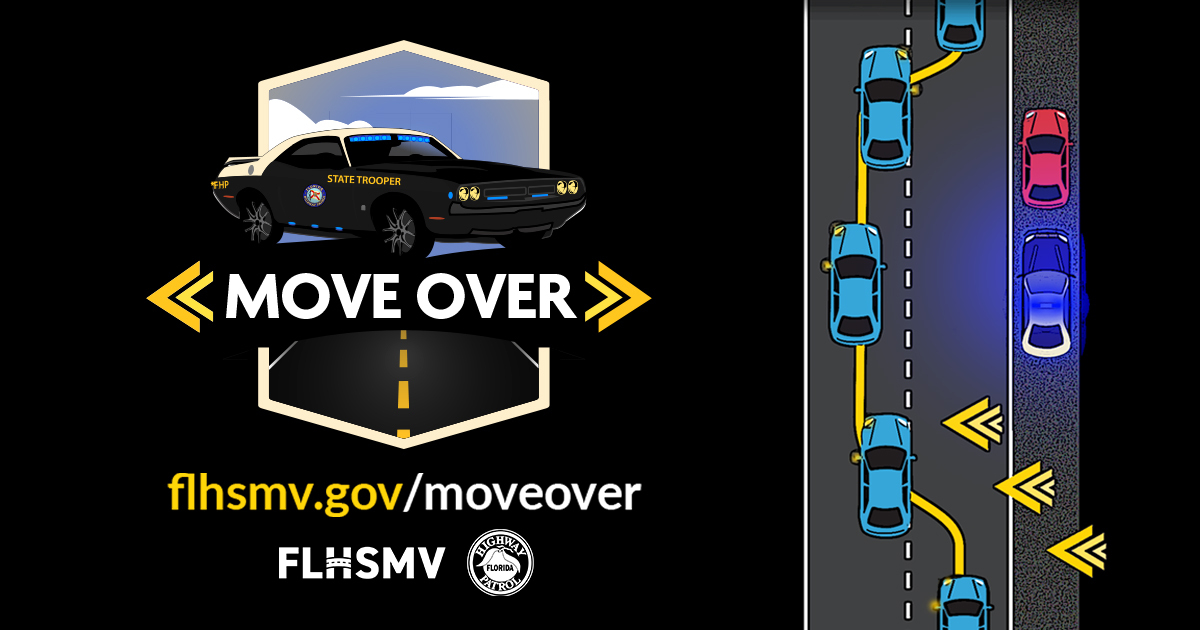
The Sunshine State is one of the many states who have adopted the Move Over Law to include stranded and disabled vehicles. This has already applied to law enforcement officers, first responders, and all those folks in neon vests for over 20 years.
Have you ever pulled over on the side of the interstate and changed a flat tire? If you have, then you know that vehicles whipping by you at 70+ miles an hour, only mere feet away from you, can be terrifying. For others, it can be worse.
The most likely to violate the Move Over Act is drivers aged 20-40. This age group is less likely to move over or slow down when they approach any vehicle on the sides of the road and that includes construction vehicles. Let’s change that.
Here’s a breakdown of what Florida drivers need to understand regarding the extended law and its implications:
The Florida Move Over Law necessitates drivers to either shift over one lane when feasible or reduce speed for various stopped vehicles, even in the absence of warning signs or channelizing devices. These include:
According to the American Automobile Association (AAA), “from 2016-2020, an average of nearly 350 people per year were struck and killed while outside a disabled vehicle on the roadside.”
AAA data shows that the roadside can be especially deadly for tow truck operators, who "are killed at a rate of almost 43 deaths per 100,000 workers, compared to just three for all other industries.”
There are situations where moving over isn’t possible, such as single-lane roads or heavy traffic. In such cases, drivers are mandated to decrease their speed to 20 miles per hour below the limit. If the limit is 20 mph or lower, they should slow down to 5 mph.
The Move Over law was initially enacted to safeguard law enforcement officers, emergency responders, and workers from potential accidents caused by passing vehicles. This requirement to either change lanes or decelerate significantly diminishes the risk of collisions that could endanger workers, their vehicles and even cause death.
Failure to adhere to the Move Over law could result in fines, fees, and points on one's license. In cases where an accident occurs, leading to injuries or fatalities, legal repercussions including increased fines or imprisonment may apply. In 2022, there were 170 crashes and more than 14,000 citations issued for motorists failing to move over in Florida.
The legislative update in 2023 broadened the Move Over law to encompass any broken-down vehicle, even in the absence of occupants. This expansion was part of a comprehensive transportation bill, HB 425, signed into law by Governor DeSantis.
High rates of fatalities in roadside accidents in Florida, as reported by the Bureau of Labor Statistics, drove the need for the expansion. Many accidents involve workers struck by passing vehicles failing to comply with the Move Over law, leading to severe injuries or fatalities. The intention of the law update is to prevent such tragedies and bring more awareness to the issue.
Following the enactment of the updated Move Over law, drivers must either change lanes or reduce speed when encountering a broken-down vehicle with hazard lights activated, irrespective of the presence of workers or law enforcement officers. Drivers of the halted vehicles are obligated to activate their hazard lights to signal other drivers to move over.
While HB 425 takes effect in July 2023, enforcement of the Move Over provision starts in January 2024. This grace period allows drivers to adapt to the changes. However, from the beginning of the new year, failure to comply may result in fines up to $158.
Call 911 if there is an emergency as everyone’s safety is paramount. Having the police come as well is key to file an official report as you take pictures, collect the other driver’s information and call your insurance company. If you are unsure of what to do, you can always call MANEY | GORDON Trial Lawyers and we can walk you through the steps so that everything is handled appropriately.
Drive safe. Take your time. Everything can wait just a couple minutes longer if your safety is at risk. Even if you’re 20 – 40 years old.